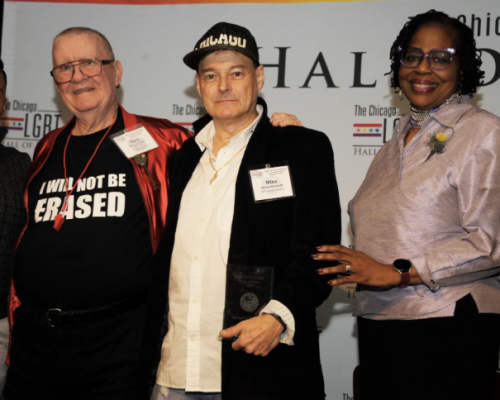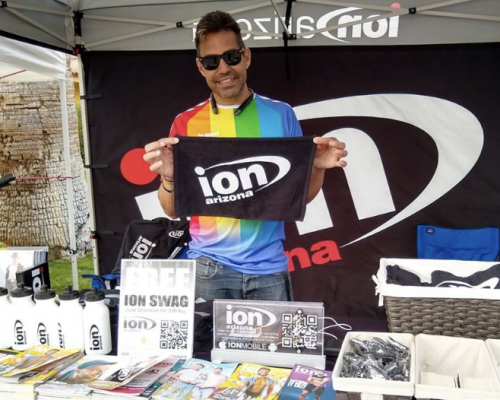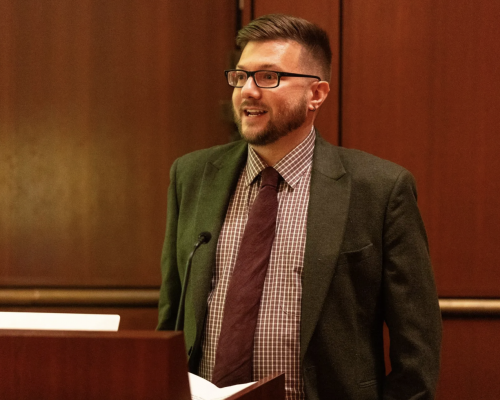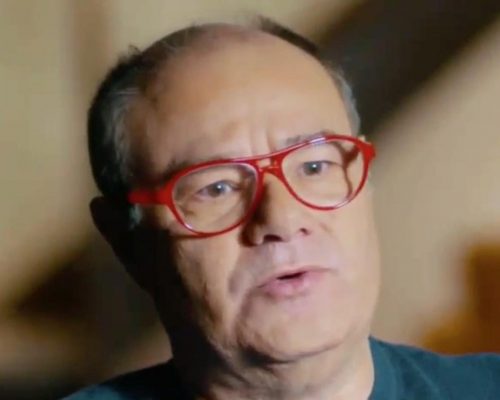Day-long LGBT Netroots Connect gathering focuses on issues affecting community
by Chuck Colbert
DETROIT — More than 120 LGBT activists, bloggers, organizations, funders and journalists from across the U.S., Canada and Mexico gathered in Detroit last month for a day-long discussion about the future of the LGBT movement and ways to effect progressive social change within it and beyond.
Organized by Mike Rogers, vice chairman and managing director of Raw Story Media, the LGBT Netroots Connect program, now in its seventh year, has more than doubled its size from the initial 60-people meeting, which was then called the National Blogger and Citizen Journalist Initiative.
 |
Organizer Mike Rogers
(Photo: Chuck Colbert) |
Since 2008, Netroots Connect has done “a great job,” said Rogers, its program director, in broadening the scope of the program and its participants. “Our team is no longer just bloggers, but also social media activists and more, from all over the country, engaged in social change.”
What’s really important, he said, is “intersectionality,” the connecting of LGBT concerns with broader progressive issues like economic justice, immigration reform, the labor movement, reproductive rights, affordable health care, religious liberty and the environment.
Enabling people to make personal connections, the face-to-face networking not possible through email exchanges and instant messaging, is also paramount, Rogers said. “My strength is the schmooze.”
LGBT Netroots Connect was held on July 16, just one day before Netroots Nation (July 17-20), the annual political convention for American liberal and progressive activists.
Even before the conference got underway, Michigan-based Between the Lines, an LGBT publication, ran a front-page feature story, “Intersectionality in Focus,” which was a preview to Netroots Nation. The Between the Lines feature included the topics of choice — the environment, housing and immigration.
VP Biden heckled, applauded
The three-day convention drew 2,000-3,000 attendees to the Motor City’s Cobo Center, including Vice President Joe Biden, who addressed the gathering.
“This is one of those moments that people get a change to bend history just a little bit,” Biden said. “And there are fundamental changes taking place.”
Biden’s speech touched on a number of LGBT themes, including marriage equality and non-discrimination policies.
Sure enough, the vice president’s remarks fell on receptive ears. “Because of you, we’ve recognized basic fundamental rights in the LGBT community,” he said.
During Biden’s speech, however, several immigration-reform advocates stood and chanted for a short time, “Stop deporting our families,” before convention security and secret-service personnel escorted them out.
The protestors were from the activist groups United We Dream and GetEqual.
Netroots Connect participants said that Biden impressed them in his handling of the incident.
“I appreciate the vice president’s hearing what was said,” explained Todd Allen, an ordained Southern Baptist minister and Mississippi LGBT activist. “How many times does a politician have protestors hear what they are saying and in effect say, ‘I feel your pain.’”
Sean Howell of San Francisco, founder and CEO of Hornet, a gay men’s social network, said Biden’s empathy touched him.
Howell was referring to the vice president’s acknowledgment that he shared the protestors’ sentiments, going so far as to give a personal story about “how terrible it must be to come home from school and wonder if your parents have been deported,” Howell said.
That Biden said everyone should applaud the protestors resonated poignantly with Howell.
Netroots Nation also drew U.S. Sen. Elizabeth Warren of Massachusetts who delivered the keynote address. Sounding notes of unity and populism, Warren told attendees, “If we join together, we win.”
The convention also drew the Rev. William Barber, the fiery African-American preacher behind North Carolina’s Moral Monday movement, a grassroots response to a conservative Republican takeover of the state’s executive and legislative branches of government. Barber’s Thursday evening opening plenary speech focused on economic justice as a moral issue.
In addition to educational workshops, training sessions and panel presentations on a wide range of progressive causes, this year’s Netroots Nation featured a full platter of LGBT-focused content, including caucuses for queer people of color, LGBTs, transgender and allies, and on equality legislation, as well as sessions about the labor movement, sex-positive talk, transgender military service, fighting religious exemptions and fake (or junk) science.
Altogether, Netroots Nation and LGBT Netroots Connect infused attendees with new energy and enthusiasm heading into the 2014 mid-term elections.
“For me, the best part is connecting with fellow LGBT journalists and activists,” said transgender activist Rebecca Juro, media correspondent for Advocate.com and a Gay Voices contributor at The Huffington Post. At LGBT Netroots Connect, she said, “I participated in a group discussion on being fierce without being frightening, which was definitely a highlight for me.”
For Juro, more effective advocacy for equality comes from uniting and working together, she said.
That take away message resonated with Shannon Cuttle, managing director of Anti-Bullying Initiatives for Garden State Equality, a New Jersey-based LGBT advocacy and civil rights organization.
“Seeing so many activists from all over the country, grassroots and grass tops,” along with “bloggers and journalists together in the same room was inspiring, impactful, and powerful and speaks to the progress our movement is making,” he said.
For Cuttle, in his work, a key takeaway point from Netroots Connect is how “we are all in this together,” he said. “That’s true and has resonated through the whole conference.”
Yet another attendee offered her take on the importance of the daylong gathering.
 |
Activist Sue Fulton
(Photo: Chuck Colbert) |
“My concerns that the LGBT activist community is fixated on marriage equality were, happily, dispelled by the Netroots Connect meeting,” said Sue Fulton, a former Army officer and West Point graduate who serves on the board of Sparta, an LGBT military organization. “I got to be part of spirited planning discussions about transgender military service, Southern strategy, immigration reform and countering myths about bisexuals.”
Jason Parsley, associate publisher at South Florida Gay News, shared Fulton’s outlook.
“It was refreshing to participate in a discussion that wasn’t dominated by gay marriage and be able to explore other topics facing the community right now like immigration reform, LGBT youth, homelessness and PrEP, among others,” he said.
“I really enjoyed the interactivity of the daylong event. It kept me interested and engaged throughout the day,” Parsley added. “As a member of the LGBT media, it just re-enforced the idea that there is still a need for vibrant and dynamic LGBT media outlets. There are so many issues the community is facing and will be facing that it’s important for the gay media to be present and able to report and tell these stories.”
For Seth Adam, director of communications for the Gay & Lesbian Alliance Against Discrimination (GLAAD), “Probably the most incredible part of the LGBT Netroots Connect experience is the people you meet and the relationships you build. Collaboration is so important to moving equality forward, and coming here to meet some of the most brilliant and passionate minds in the movement isn’t just inspiring, it’s really essential.”
 |
Between The Lines publisher Jan Stevenson (left)
and editor in chief Susan Horowitz
(Photo: Chuck Colbert) |
And yet, Susan Horowitz, editor in chief of Between the Lines, voiced concern about a lack of attention to LGBT seniors.
“There is a complete lack of understanding of the whole senior aging LGBT community here,” she said, “with very limited voice, if any. I was thinking about how scary that is because this is a generation that is aging in their late 60s, 70s, 80s and 90s, and is the most closeted group and the most likely not to have family network support. This is the intersectionality of the aging demographic that needs to build support systems — like the younger generation already has — that includes seniors that are voiceless. There no simple solution or sexy sound bite that’s’ going to solve it. But we all have to be growing in awareness so that seniors are secure.”
Religious liberty/religious exemptions
The U.S. Supreme Court’s so-called Hobby Lobby decision, a religious exemption in the federal Employment Non-Discrimination Act (ENDA), and legislative attempts in a number of states by social conservatives that would enable persons to discriminate against LGBTs and same-sex couples based on religious beliefs opposed to homosexuality all served to raise the level of concern among Netroots Connect participants about the harm religious exemptions cause in advancing LGBT equality.
At one session, attendees voiced their concerns and discussed actions that ranged from education and outreach about First Amendment rights to adamant opposition to any exemptions that wall off LGBTs from non-discriminatory laws or policies.
In Burwell v. Hobby Lobby Stores Inc., the Court ruled 5-4 that the Department of Health and Human Services regulations requiring employers to provide their female employees with no-cost access to contraception violate the 1993 Religious Freedom Restoration Act.
In addition, advocates for LGBT equality maintain the proposed religious exemption included in the current version of ENDA is unprecedented in civil rights legislation and would in effect gut the non-discrimination protections.
And a Mississippi law, which went into effect July 1, allows people to discriminate against LGBTs and others if they feel their religious convictions are at compromised.
Jeff White-Perkins, president of the Mississippi Gulf Coast Lesbian and Gay Community Center, said his “general feeling as a Mississippi activist, of being alone in the work, has been lessened” by Netroots Connect and conference conversations over religious exemptions.
“I truly saw that though Mississippi has a long way to go, we are being seen as somewhat the endgame for most of the issues that stand today from equality to even women’s rights,” he said. “That idea has me very excited.”
Already two campaigns are underway in response to the state’s anti-LGBT law.
One is “We don’t discriminate: If you’re buying, we’re selling” (http://ifyourebuying.com), which is a Mississippi business owners campaign, giving out stickers free of charge to any business that wishes to take a public stand against discrimination of any kind and for equality.
The other is the “Y’all means ALL” campaign, which is a “grassroots movement of people living in the South who choose not to live in the past,” according to its mission statement (https://www.facebook.com/yallmeansall), adding, “If “y’all” means anything, it must mean EVERYONE is included.”
On religious freedom, “There has been a real awakening in the community about how religious exemptions affect our lives and the lives of people we care about, the women in our lives, and the ramifications go far beyond what we ever understood until this year,” said John Bare of San Francisco, who serves on the board of directors for GetEqual and chairs its governance committee.
“Now we are understanding that our own bill [ENDA], the one we’ve been fighting for for 40 years, has those religious exemptions,” which “are really quite obnoxious and could do a lot of damage beyond our own community,” he added.
And yet, “There’s a real understanding that we need to come out strong as a community opposed to that,” Bare explained. “We need to start with education about what the First Amendment guarantees all of us in terms of our freedom of religion and in terms of what else we might describe as religious freedom. But our own private notion of our conscience and our religious liberty does not allow for going into the public square to discriminate.”
GetEQUAL, a bold-action LGBTQ advocacy organization, Bare said, is “trying to get the word out about that,” with a new #NoAsterisks campaign (www.NoAsterisks.org), which educates about full civil rights for LGBTs — without exceptions.
TOP STORY
Volume 16
Issue 5






